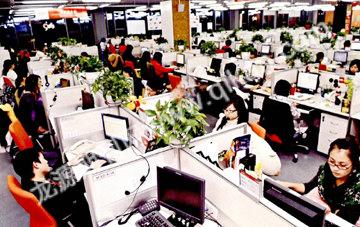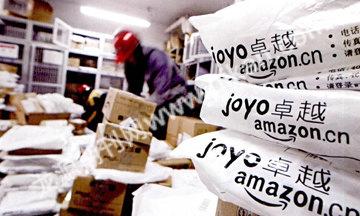Online Shopping Business Develops by Leaps and Bounds
By staff reporter LU RUCAI

While retarding the conventional economy, the on-going financial crisis has breathed fresh air into e-shopping. Since September 2008, Chinas largest C2C e-shopping mall, Taobao, has witnessed the creation of 200,000 new stores each month.
ON Monday morning, Xu Xiaoping, an administrative staff member of a non-state-owned book company, received three deliveries: some books ordered from Joyo Amazon, a briefcase for her husband and a car vacuum cleaner, both from Taobao. It is estimated that the number of Chinese online buyers has surmounted 100 million.
Bargain-hunting Online
“Everyday, an endless stream of couriers shuttle between e-stores and office buildings,” remarks Xu Xiaoping. “Nowadays, people are used to purchasing online. Sometimes, I even place orders for office commodities online, like Inkjet paper and stationery, and I get them for a low price.” In terms of the companys purchases, what the boss is really concerned about is the cost, not the source. So, from one perspective, one advantage of online shopping is that it can help to keep the boss happy.
“Im not shopping online blindly. Before placing an order, I have already decided the brand and style I want in a shopping mall or thumbed through the books I need in a bookstore.” Xu Xiaoping regards herself as a rational buyer. The current global financial slump has changed her attitude towards shopping. “Except for food and daily commodities, I seldom go shopping now. The first thought that flashes through my mind when I come across an item I want is to search for a bargain price online.” In her experience, products such as small household appliances and books cost 30 percent less in e-shops.

Because the cost of shop rental and staff employment is largely reduced, e-shops can afford to have very competitive prices, which is one of the main reasons they attract so many customers. In 2008, the turnover of online businesses in China reached RMB 130 billion (RMB 6.83=US $1), an increase of 130 percent over the previous year, of which RMB 99.96 billion was generated by the Taobao e-shopping mall.
A huge variety of products ranging from clothing, cosmetics, and digital products to porcelain, woodwork, or indeed any item sold by a brick-and-mortar retailer, can be easily found online. Statistics published by Taobao found that, in 2008, the top 15 commodities sold online were clothes (140 million), cell phones (13.66 million), cosmetics (71.48 million), household items (47.39 million), sports and outdoor equipment (32.22 million), personal computers and accessories (14.48 million), jewelry and accessories (30.24 million), laptops (11.80 million), small home appliances (13.28 million sets), prepaid mobile phone cards (31.30 million), foodstuff (23.46 million), maternal and childrens products (31.78 million), cameras and video cameras (6.12 million), vehicle accessories (7.68 million) and book and audio-video products(25.41 million).
Xu Xiaoping has now become a VIP member at both Taobao and Joyo Amazon and enjoys a preferential discount at both websites. In only a short period over the 2009 Spring Festival, she spent more than RMB 3,000 in e-shops purchasing gifts for her family and friends.

Development in an
Upward Spiral
Chinese domestic appliance retailer, Gome, achieved sales of RMB 100 billion in 2007, taking the retail business crown that year. It took Gome 20 years to accomplish these sorts of sales, but it took Taobao only five years to achieve similar sales from the time of its establishment in 2003, until the end of 2008.
In the initial stages following Taobaos establishment, investors, clients, and even the founder of the Alibaba Group itself held a pessimistic view of its progress. However, the website underwent a complete reversal of fortune to become the most successful online retailer in Asia. Ma Yun, president of the Alibaba Group, has set the company a goal of exceeding the sales of Wal-Mart within ten years. In 2008, Wal-Marts global sales reached RMB 2.7 trillion, 30 times that of Taobao. However, Ma Yun says, “In order to attract 10,000 customers, Wal-Mart needs to spend huge funds to acquireland, equipment and storage space. In contrast, we just need one more computer.” Confident in his assertion, Ma Yun decided to inject additional capital of RMB 2 billion into Taobao.
More and more investors have shown interest in the increasing business potential of e-stores and have begun to start up businesses in this field. The 2008 China Commercial Website Billboard, published by China Internet Weekly, shows that Taobao, Joyo Amazon, Tencent Paipai, Dangdang and Jingdong 360buy top the ranks. Of these, Taobao and Tencent Paipai specialize in C2C (consumer to consumer) trade, and the remaining three mainly provide a B2C (business to consumer) trade platform. Among current Chinese e-stores, C2C trade is the most popular, accounting for 80 percent of all online sales.
iResearch Group, specializing in providing Internet and e-business consulting, states that the number of buyers signed up to e-stores in 2008 reached 120 million, an increase of 185 percent over the previous year. This new trend in shopping has sprung up in large and small cities alike, attracting all kinds of buyers, from youngsters to the elderly. Among the millions of consumers signed up to Taobao, 83 percent are between 16 to 32 years old with the remaining 17 percent over 33. The 25 to 32 age group is the pillar of e-store buyers, making up 48 percent of the total.
Statistics from iResearch Group show that the top five provinces for online sales are Shanghai, Guangdong, Zhejiang, Jiangsu and Beijing. Shanghai has more than 7 million online buyers and, during 2008, the average consumption per capita of those buyers was about RMB 2,200.
Opportunities in Crises
In 2008, Taobao provided 570,000 direct and over 1 million indirect employment opportunities in Internet industries like logistics, finance and marketing. When the job market in traditional industries looks bleak, the rapid growth of Internet companies provides a beacon of light for the unemployed.
Hu Ming, a staff member of an IT enterprise, also works as a part-time e-shop seller using Taobao. His wife, a stewardess for a domestic airline, often travels from China to other countries, providing them with a unique business opportunity.“My e-shop specializes in overseas purchase of luxury cosmetics and food products,” explains Hu Ming. As only a part-time seller, he is not chained to a computer all day and does not have to constantly deal with orders, but he is still a popular seller and has many devoted patrons due to his authentic goods and fair prices.
Running an e-store on Taobao and other similar net platforms costs nothing and therefore attracts many students and unemployed workers. Wang Jing, an experienced seller on Taobao, moonlighted as an e-shop trader selling domestic cosmetic products while she was in college. After graduating, she decided to work as a full-time e-shop seller and has now hired several staff members to help deal with her orders and deliveries.
Figures provided by Taobao show that the number of new e-stores opening per month is almost 200,000, equal to roughly 5,000 to 6,000 each day.
In addition, online shopping has reversed the traditional view of shopping as a female dominated activity. Figures co-published by iResearch Group and Taobao indicate that 55 percent of e-store buyers are male. Moreover, male buyers mainly concentrate on digital products and their expenditure in this area greatly exceeds that of female buyers. “Male customers, who dislike window shopping, find that the Internet can provide them with a method of shopping which suits them better,” says Hu Ming. According to his experience, “Generally speaking, male buyers are more generous with their money and are seldom picky with goods.”
Furthermore, during financial crisis, when the popularity of traditional shopping methods takes a turn for the worse, the perfect opportunity exists for e-shops to earn a great deal of money. The man in charge of Dangdang believes that e-stores targeting domestic demand are likely to be more successful during hard times. A survey conducted by iResearch Group also revealed that the financial slump has not caused any negative impacts on e-store businesses yet. People appear to have an untiring enthusiasm for e-store shopping as 79 percent of Internet users continue to shop online.
Security and Service Come First
“Every Internet buyer may come across fake commodities or items which do not match their online description,” remarks Xu Xiaoping. With their integrated operation of procurement, storage, sale and delivery, large-scale B2C net platforms like Joyo Amazon and Dangdang can exercise better control on the quality and authenticity of their goods. However, with C2C net platforms, the quality of the goods and service depends largely on the honesty and good will of individual sellers.
After talking to colleagues and friends, Xu Xiaoping found that when buyers place orders on B2C net platforms, they do so to ensure they will receive genuine products and will happily accept the relatively high price for them. In addition, many bargain hunters that use C2C net platforms are aware that some of the products on offer are counterfeit.
Despite this knowledge, there are still complaints when some buyers find that the products they have bought do not match their online descriptions. In 2008, the 3.15 Consumable Digital Products Website for Complaints, sponsored by the China Electronic Chamber of Commerce, received over 106,608 complaints. Among those, 9,172 cases were related to online shopping, including 1,700 cases against Taobao. Among the different reasons for complaint, sales swindles made up 48.14 percent, exaggerated advertising made up 23.85 percent and the remaining 20.6 percent was about fake commodities.
At present, Taobao conducts both B2C and C2C trade, having expanded from providing purely C2C trade. Concerning the reason for introducing B2C business, Taobao states, “We dont intend to take the bread out of our e-store sellers mouths, but only to meet demand. In China, honor and credibility are vital in ensuring smooth progress of e-store business.” In fact, most new buyers prefer to perform their first online shopping purchase through a B2C net platform.
A professional team comprising 50 specialists has been set up by Taobao to supervise and deal with the issue of fake commodities. Moreover, several policies have been introduced and are continuously implemented, such as “Advance Compensation,” the “Customer Guarantee Scheme” and the “Buyers Complain and Sellers Disprove” system. Once a complaint put forward by a brand owner or customer has been verified, Taobao immediately asks the seller in question to remove the relevant products from their e-store, or may even close the shop completely if it is a very serious case. In addition, identity cards must be provided for authentication if one plans to run an e-store on Taobao. If a seller is caught selling fake or shoddy commodities, he or she will be banned for three to five years, or maybe even for life in serious cases. Ebay also has the same policy.
For B2C net platforms, which are seldom bothered by fake commodity troubles, service quality is important for them to maintain their competitive edge. Packaging, delivery speed and handling of returns are major factors that affect customers loyalty. “Joyo Amazon used to be popular with us due to its clear web layout and speedy delivery, but recently the quality of service has barely been acceptable,” says Xu Xiaoping. If the quality and price of a product is the same in two different e-stores, customers will no doubt choose the store with better service.
Dangdang and Joyo Amazon both specialize in books and commodities, so competition between the two is very intense. In 2009, Dangdang plans to expand its cash-on-delivery business to 450 cities. Joyo Amazon currently operates a similar business in 600 cities and this will likely expand to 700 within the year.
The expansion of e-stores presents attractive prospects to potential investors. According to iResearch Group, during the current financial slump, e-store business will boom in a manner similar to its last successful leap during the 2003 SARS period.

